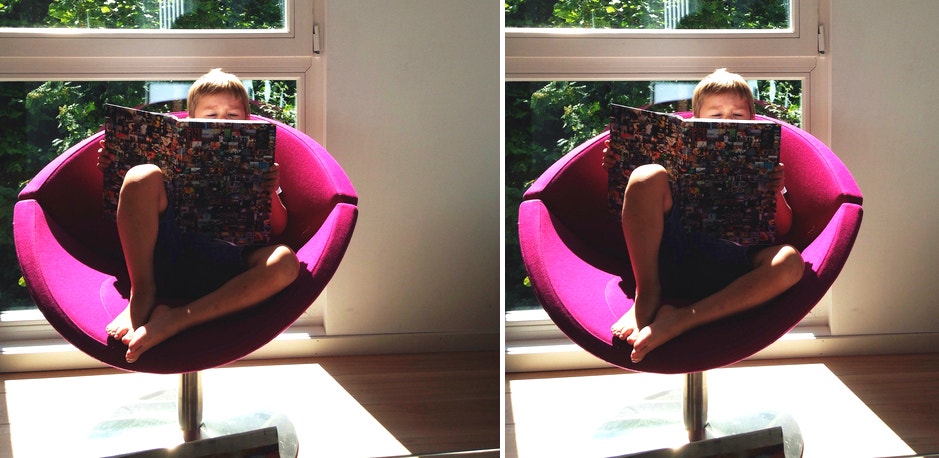My 7-Year-Old Son REFUSED To Read — But THIS Changed His Mind
Thank you to my son for showing me that there are different ways to learn literacy.
 weheartit
weheartit I'm an educator and I work with special needs children. My kids don't have special needs, so I wasn't prepared when my son was challenged by learning to read.
At the end of first grade, my son was struggling with reading. It had nothing to do with his cognitive abilities; it had more to do with his stubbornness and determination to do everything independently.
His first grade teacher suggested I hire a reading tutor, which I did. After seeing the tutor twice a week over the summer, he improved in his reading effort but still had a way to go. By the fall and now in second grade, he was at the point where he was reading on his own relatively well.
Still, it was a daily struggle to get him to do his 20 minutes of reading homework. Even bribery wouldn't work. One day, my seven-year-old came up with an idea of his own.
"I want to write a story about My Little Pony." he said. "I'll write it, and I'll spell the words by myself."
He was holding a yellow notepad and a big pen as he said this. I thought, why not? Let's see where this goes.
All of a sudden, I had flashbacks to when I was in the second grade. It was the late 80s on the Upper West Side of Manhattan, and my mom had a Macintosh plus computer. I'd use her computer to type up the stories I wrote, solely from my imagination.
"Go for it," I said.
He sat down on the couch and began to write. Occasionally, he would ask me how to spell something like the word "what" or "you're." When he asked me how to spell "your," I knew that was a teachable moment. I began to explain the difference between your and you're.
"Your is used in the context of somebody's belongings. Your jacket. Your cat," I told him.
"So, what's your with the R-E?" he asked.
"You're is a combination of the two words 'you' and 'are.' It's called a contraction"
"Oh," he said knowingly.
My boy continued to write his story. After a while he had quite a few pages on that yellow pad, all about My Little Ponies.
"I want to type up my story," he said. "Can you help me?"
Once again, my mind flashed back to myself at his age using that old Macintosh plus computer. I agreed to help, but life as a single mom is very busy. As much as I wanted to transcribe the story, I had to pause to make dinner. I had to make lunches for the next day. Apparently the story was on a tight deadline, and I soon became frustrated.
He then asked if he could type the story up by himself. Since he was using my computer, I began to get nervous about this prospect. But I fought that anxiety and I let him use my other baby, the iMac.
Though he was typing one key at a time, he didn't seem to get frustrated. The end goal was that he would print his story out on paper. This alone was exciting enough to keep him going.
"After I'm done with this story, I want to write another one with more complicated words."
"Okay, cool," I said. "But let's read this one aloud first."
He shrugged and returned to his work. Eventually, he completed his story. He read it aloud to me as we were going to bed.
"Are you going to write another one?" I asked him.
"Maybe tomorrow," he said nonchalantly.
Tomorrow came, and as soon as he got home from school my boy was searching for the yellow lined legal pad. The writing and typing continued for over a week.
After some time had passed, I decided to conduct an experiment.
I handed my son an adult fiction book and asked him to read a paragraph. He read the paragraph only requesting help once. What was most impressive was his recognition of the word "compromise." This was a child who struggled with sight words just six months ago.
Storytelling is an ancient tradition, which unites multiple cultures. Native Americans used oral storytelling to teach morality to their younger citizens. Storytelling can be used in our younger generation to teach literacy.
Making reading exciting to younger learners can be challenging. Psychologist J. Richard Gentry asserts that storytelling is indeed a way to teach children this much needed skill.
"Most parents read stories to their kids. But how many parents write them? It's not hard. Invite your child to write with you. Grab some paper and something to write with. And then make up a little story, writing it down, page by page as you go," says Gentry.
Children will learn to read if they're in the company of others who show a love for literature. As my son reads me his stories, I ask him questions about them and show an interest in their plot development.
According to Dr. Peter Gray Ph.D., a psychologist who studies children's natural ways of learning, children become literate on their own time as long they're around people who share their appreciation of the written word with them.
"As long as kids grow up in a literate society, surrounded by people who read, they will learn to read," Gray states.
By fostering my child's love of storytelling, I'm showing him that the written word is important.
I'll continue to encourage my son to write and read his stories aloud because it's beneficial to both of us. For him, he's learning to read and write; for me, I find it to be a time where we can bond with one another.
Thank you to my seven-year-old for showing me that there are different ways to learn literacy.

